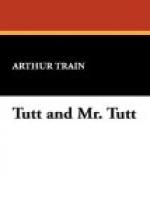“Indeed!” remarked His Honor. “And who are they? What is the case?”
“Hanged if I know,” answered Mike, snipping a piece of fluff off his judgeship’s shoulder. “There’s a white-bearded old guy, two or three swell gents with tall hats, Counselor Tutt and an attorney named Chippingham, besides that pretty Miss Wiggin; and they ain’t speakin’ none to one another, neither.”
“It must be that mining-reorganization case,” answered the judge. “Well, it’s time to go in.”
They walked down the dirty marble corridor and entered the court room, while the clerk rapped on the railing.
“Hear ye! Hear ye! Hear ye! All persons having any business to do with the District Court of the United States draw near, give your attention and you will be heard,” he intoned with unctuous authority.
The “bunch” rose and made obeisance.
“Good morning,” said the judge pleasantly, sitting down with a side switch of the bombazine. “Barrows against the—er—er—Horse’s Neck Mining Company. Do you represent the complainant, Mr. Tutt?”
“I do,” answered Mr. Tutt with great dignity. “Your Honor, this is a motion for an order to show cause why an injunction pendente lite should not issue restraining the sale of the assets, of this corporation to another in fraud of its minority stockholders—and for a receiver. My client, an aged man living upon his farm in the northern part of the state, is the owner of one hundred thousand shares in the Horse’s Neck Mining Company of the par value of one hundred thousand dollars. He has owned these securities for many years. They represent his entire capital. He is a bona fide stockholder—”
“May I be pardoned for interrupting?” sneered Chippingham, springing to his feet. “I think the court should be informed at the outset that this man, Barrows, is a notorious ex-convict.”
Judge Pollak raised his eyebrows.
“This is an outrage!” thundered Mr. Tutt, his form rising ceilingward. “My client—like all of us—has had his misfortunes, but they are happily a thing of the past; he has the same rights as if he were an archbishop, the president of a university or—a judge of this honorable court.”
“We are sitting in equity,” remarked His Honor. “The question of bona fides is a vital one. Is the complainant an ex-convict?”
“This is the complainant, sir,” cried Mr. Tutt, indicating old Doc, now for the first time in his life smartly arrayed in a new checked suit, red tie, patent-leather shoes and suede gloves, and with his beard neatly trimmed. “This is the unfortunate man whose honest savings of a lifetime are being wrested from him by an unscrupulous group of manipulators who—in my opinion—are more deserving of confinement behind prison walls than he ever was.”
The gentlemen with the tall hats bit their lips and showed signs of poorly suppressed agitation.
“But is your client an ex-convict, Mr. Tutt?” repeated the judge quietly.




